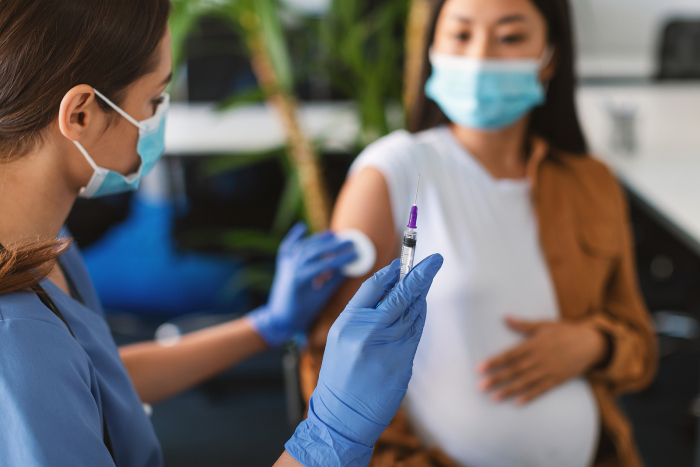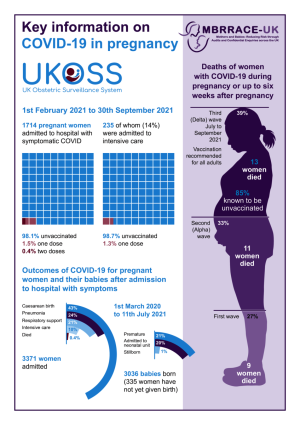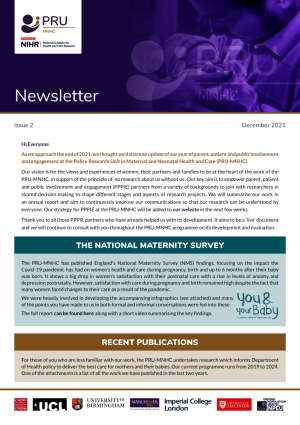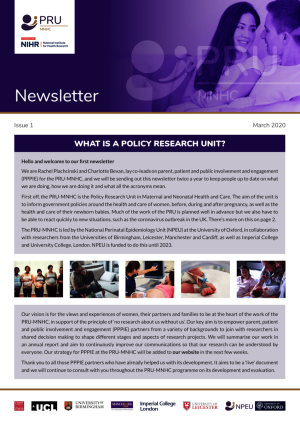Increase in severity of COVID-19 in pregnancy

Published on Tuesday, 12 October 2021
At the beginning of the pandemic last year, we knew very little about the effect of COVID-19 on pregnant women and their babies. The rapid analyses of cases undertaken by researchers at the National Perinatal Epidemiology Unit (NPEU) in the first wave was reassuring, in that outcomes for pregnant women who were admitted to hospital with COVID-19 were largely good, and very few babies became either infected or ill. This data was collected by the UK Obstetric Surveillance System (UKOSS) at the NPEU, which feeds into the Policy Research Unit (PRU). Further data on the impact of COVID-19 on babies is being collected by the British Paediatric Surveillance Unit.
However, as the pandemic has continued, there appear to have been changes in how severely ill pregnant women have become. The differences in the severity of COVID-19 infection in pregnancy seems to be related to the variant of COVID-19 women are infected by. Pregnant women admitted to hospital with COVID-19 symptoms in the second wave of infection (the 'Kent' or 'Alpha' variant) were more likely to be severely ill than pregnant women admitted in the first wave of infection. Pregnant women admitted with infection in the third (Delta) wave are even more likely to be severely ill. Although maternal deaths are still uncommon, there have now been more maternal deaths from COVID-19 in the most recent (Delta) wave of infection compared with either the first or second waves.

Key information on COVID-19 in pregnancy
As the infographic illustrates: nine women died in the first wave (this meant that 27% of all maternal deaths from COVID-19 were in that period); 11 women died in the second wave (representing 33% of all maternal deaths from COVID-19) and 33 women (representing 39% of all maternal deaths from COVID-19) in the third wave. Far from declining in numbers, as other groups of the UK population have, maternal deaths from COVID-19 seems to be increasing.
At the same time, we know that many pregnant women remain unvaccinated. Information from the UKOSS study of pregnant women admitted with COVID-19 shows that more than 98% of women who are admitted into hospital have not been vaccinated. The majority of pregnant women admitted to intensive care and who die are also unvaccinated.
The UKOSS data gives real world evidence of the protection obtained by vaccination. Public Health England and Public Health Scotland data combined indicate that around 100,000 pregnant women have received a vaccine in England and Scotland. The population of the UK giving birth every year is around 700,000. Since February 1st 2021, of the 1,714 women admitted to hospital with symptomatic COVID-19, only 32 women had been vaccinated, 26 of whom had had only a single dose.
The effects of COVID-19 on pregnant women will also have an impact on their babies, and outcomes for them are also illustrated in our new infographic. This new information strongly supports the recommendation from the Royal College of Obstetricians and Gynaecologists (RCOG) and Royal College of Midwives (RCM) that all pregnant women should be vaccinated. The RCOG and RCM have produced tools and additional information for women and families on COVID-19 vaccines, as well as COVID-19 and pregnancy, which are available at:


